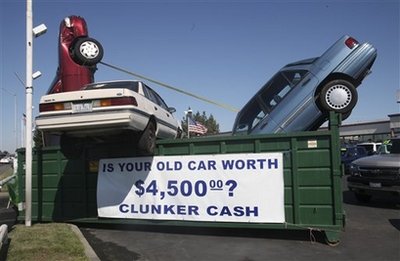Recession Over?
While it is good news that the economy grew last quarter I think claims that the recession is over are premature. Why? Because I think the last quarter’s numbers are due to gimmicks by the Obama Administration as was discussed last night on OTB Blog Radio and also when looking at this post by Dave Shuler at the Glittering Eye. Namely the Cash for Clunkers program; when one looks closely at the Bureau of Economic Analysis’ release on GDP there is this,
Real personal consumption expenditures increased 3.4 percent in the third quarter, in contrast to a decrease of 0.9 percent in the second. Durable goods increased 22.3 percent, in contrast to a decrease of 5.6 percent. The third-quarter increase largely reflected motor vehicle purchases under the Consumer Assistance to Recycle and Save Act of 2009 (popularly called, “Cash for Clunkers” Program). Nondurable goods increased 2.0 percent in the third quarter, in contrast to a decrease of 1.9 percent in the second. Services increased 1.2 percent, compared with an increase of 0.2 percent.
In other words, remove the Cash for Clunkers program and the increase would likely be much, much smaller.
We also have this story that notes the fall in consumer spending once the Cash for Clunkers program stopped.
On a real (inflation-adjusted) basis, consumer spending sank a seasonally adjusted 0.6% in September, a reversal from the 1% gain seen during in August, the government’s data showed. It was the largest decline in spending since December.
[…]
Despite overall growth in the economy in the third quarter, incomes aren’t growing and jobs are still being lost at a rapid pace.
“The labor market remains challenging and until we see real improvement, sustained wage gains will be elusive,” wrote Adam York, economist with Wells Fargo Securities.
The way I read that is that it is likely too premature to say that the recession is over.
We can also see this by looking at the BEA’s release on personal income and expenditures. No matter how you look at the data, nominal, real, or chained 2005 dollars personal consumption expenditures have dropped in September.
Purchases of motor vehicles and parts accounted for most of the decrease in September and for most of the increase in August, reflecting the impact of the federal CARS program (popularly called “cash for clunkers”). The program, which provided a credit for customers who purchased a qualifying new, more fuel efficient auto or light truck, ended on August 24, 2009…. Purchases of nondurable goods increased 0.5 percent in September, compared with an increase of 0.9 percent in August. Purchases of services increased 0.1 percent, compared with an increase of 0.2 percent.
Note that the largest increase is for consumer durables. These are goods that last and as such the consumers who bought these goods will not be buying them again and there is no longer any subsidy for other consumers to make similar purchases.
Another gimmick is the subsidy for home buyers. A first-time home buyer can get an $8,000 tax credit when purchasing a home. While this provides a stimulus for the housing market and the related industries, it is unlikely that this sector of the economy is going to be one that provides substantial growth for the future. The past contributions from the housing/real estate market were the result of a bubble. As such, the economy is trying to move resources out of that segment of the economy. This kind of subsidy merely slows that process down and prevents those resources from being moved to whatever sectors might provide future growth.





The NBER looks at more than GDP. I will be a little surprised if they declare the recession over already. I agree that the housing subsidy needs to go.
On the brighter side, Simon Johnson noted today that there are stronger signs of recovery around the world. Barring a shock of some sort, I would expect us to have low GDP growth for a while.
Steve
I suspect that rigorous analysis of “true” GDP growth is a very difficult task.
However, since in my business I traffic in gross trends vs minute analysis, I’d posit that after factoring in cash for clunkers and the housing subsidy that real annualized GDP growth is in the range of 1 to 1.5%.
I really need to keep brushing up on my Japanese………..
The cars and houses programs were both stupid. Renewing them would be doubly so.
Stimulus should have been a time-shifting of necessary costs, moving forward projects that might have been done later, in periods of higher investment and employment.
Konnichiwa Drew-san.
Odograph,
Uhhmmmm, both Cash for Clunkers and the housing subsidy are time shifting policies.
I’m sorry, I thought that was clear. I meant time-shifting of necessary government expenditures. If you need to test some clean coal, do it now rather than later. If you need to develop a cheap rocket to replace the space shuttle, accelerate the program. Bridge repair? Apparently we need more of that. Etc.
I didn’t mean that I support programs to lure consumers in their own time shifting.
BTW, I think this is another “where the billions went” storyline we should be following:
Why the Goldman Sachs-AIG Story Won’t Go Away
Worse than I thought. A survey of articles over the weekend place GDP growth at .5%…….plus or minus.
The shell game isn’t working.